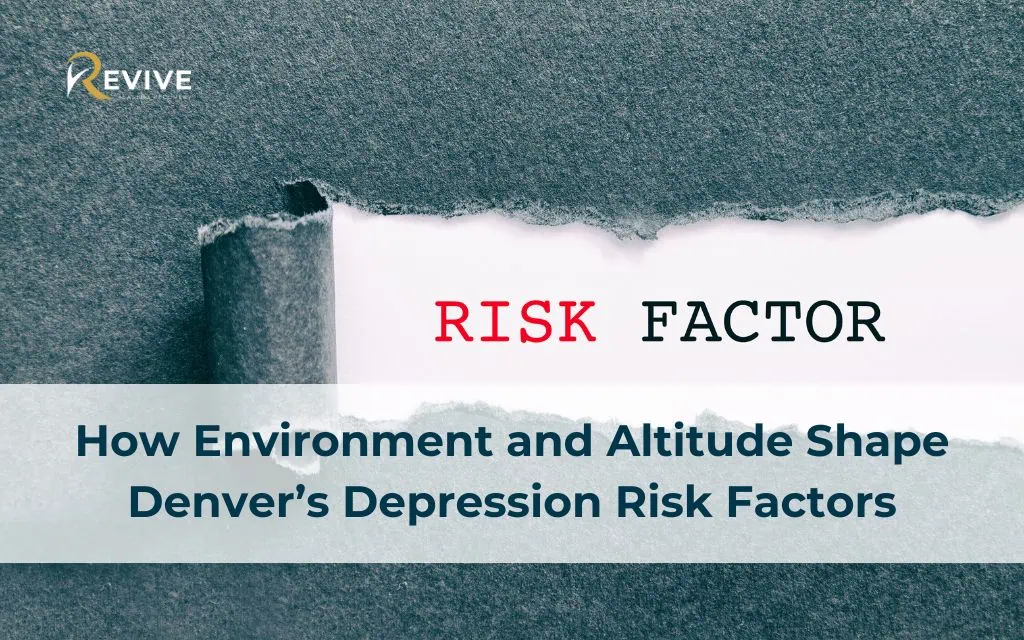While Denver’s stunning landscapes and outdoor lifestyle may seem like a haven for health, the city faces higher-than-average depression rates. Denver depression risk factors are shaped by unique environmental elements, including the city’s high altitude, climate, and social dynamics. These factors contribute to a distinctive risk profile for residents.
At Revive Health Recovery, we specialize in identifying and addressing these local triggers to support your mental well-being. Understanding these factors is crucial for finding the right depression recovery paths, and we’re here to guide you toward effective solutions tailored to Denver’s specific needs. Explore how targeted care can help you manage and overcome depression in a city with such unique challenges.
The Altitude Effect: How Denver’s Elevation Impacts Your Mood
The Science of Altitude-Induced Depression
Living at 5,280 feet above sea level affects more than just your breathing and athletic performance. Research shows Denver’s elevation significantly impacts brain chemistry through reduced oxygen levels, creating what scientists call hypoxic conditions. Studies have found a 32% higher depression rate at high altitudes compared to sea level locations.
This altitude-induced hypoxia disrupts neurotransmitter function, particularly affecting serotonin and dopamine—key brain chemicals that regulate mood. Colorado School of Public Health researchers have documented this connection between Denver’s elevation and altered brain chemistry, explaining why new residents often experience unexpected mood changes.
Recognizing Altitude-Related Mood Changes
Altitude-related depression often manifests differently than typical depression. Common symptoms include:
- Fatigue that doesn’t improve with rest
- Difficulty concentrating despite adequate sleep
- Unexplained irritability or anxiety
- Mood fluctuations that seem disconnected from life events
Most people require 1-2 weeks for initial adaptation to Denver’s altitude, but complete neurological adjustment can take 3-6 months. Those most vulnerable include recent transplants from lower elevations, people with pre-existing mood disorders, and individuals with certain genetic factors affecting oxygen utilization.

Seasonal Factors: Denver’s Climate and Your Mental Wellbeing
Beyond SAD: Denver’s Unique Seasonal Patterns
Denver’s 300+ annual sunny days create a false impression that seasonal depression isn’t a concern here. In reality, Denver’s seasonal light patterns create a distinctive form of Seasonal Affective Disorder (SAD). The dramatic contrast between intensely bright snow-reflected days and early winter sunsets disrupts circadian rhythms more severely than consistently overcast locations.
Colorado depression rates show pronounced seasonal patterns, with Denver Health reporting a 27% increase in depression-related visits during transition months (October-November and March-April) when daylight hours change most rapidly.
Light Exposure Strategies for Denver Residents
Denver residents benefit from specialized approaches to light therapy:
- Morning light exposure between 6-8 AM helps reset circadian rhythms
- Brief midday outdoor breaks, even on cold days, provide critical natural light
- Evening light management to accommodate Denver’s early winter sunsets
Denver depression specialists recommend implementing these strategies before seasonal symptoms emerge, particularly for those with previous SAD experiences.
Economic Stressors: Housing, Cost of Living, and Mental Health
The Housing Crisis and Psychological Impact
Denver’s housing market has created unprecedented financial stress for residents. With housing costs increasing nearly 80% over the past decade while wages rose only 23%, the resulting housing insecurity directly impacts mental health.
Research links housing instability to increased depression rates, with one Denver study finding residents spending over 30% of income on housing showed double the depression rates of those with more affordable housing. Community disruption from frequent moves and gentrification further erodes support networks essential for mental wellness.
Financial Wellness Resources for Denver Residents
Several Denver organizations provide support for housing-related stress:
- Housing stability programs offering emergency assistance
- Financial counseling services specializing in Denver’s unique market
- Community support networks in rapidly changing neighborhoods
Revive Health Recovery incorporates financial wellness into our depression treatment approach, recognizing how Denver’s economic pressures contribute to mental health challenges.

Environmental Influences: Air Quality and Cannabis Considerations
Denver’s Air Quality Challenges and Mental Health
Denver’s geographic location creates air quality issues that impact mental health. The “brown cloud” of pollution trapped by mountain geography combines with increasing wildfire smoke to create seasonal air quality concerns.
Research now connects air pollution exposure to inflammation affecting brain function, with measurable impacts on depression rates. Denver residents with respiratory conditions face compounded risks, as physical breathing difficulties can trigger anxiety and deepen depression.
Cannabis Legalization: Mental Health Implications
Colorado’s pioneering cannabis legalization offers both opportunities and challenges for mental health. While some individuals report symptom relief from cannabis use, Colorado researchers have found concerning links between high-potency THC products and increased depression risks.
For Denver residents with pre-existing depression or genetic vulnerability, cannabis impacts require careful consideration. The Colorado Department of Public Health and Environment continues to study these connections, finding that approximately 12% of regular cannabis users report worsened depression symptoms over time.
Social Factors: Isolation and Community in the Mile High City
The Paradox of Denver’s Social Landscape
Despite Denver’s reputation for outdoor activity and social engagement, many residents experience profound isolation. The city’s high percentage of transplants (over 60% born outside Colorado) means many lack established social networks and family support.
This social disconnection creates what mental health professionals call “Denver’s paradox”—the contradiction of feeling lonely in a seemingly socially active environment. Denver depression treatment must address this unique social context to be effective.
Building Community Connections in Denver
Effective depression recovery in Denver often requires intentional community building:
- Structured social groups focused on common interests
- Support networks specific to transplant experiences
- Digital connections that translate to in-person relationships
Revive Health Recovery incorporates community building into our depression treatment programs, recognizing how critical social connection is for Denver residents.

FAQs About Denver Depression Risk Factors
Does living at Denver’s high altitude really affect depression risk?
Yes, research shows that living at Denver’s elevation of 5,280 feet significantly impacts brain chemistry, with studies indicating a 32% higher risk of depression symptoms compared to sea level. Revive Health Recovery specializes in addressing these altitude-related factors.
How long does it take to adapt to Denver’s altitude regarding mental health?
Most people experience some adaptation within 1-2 weeks, but complete neurological adjustment takes 3-6 months. Revive Health Recovery offers support through this transition period with specialized programs for new Denver residents.
Does Denver’s cannabis legalization affect depression rates?
Research shows mixed effects – while some studies indicate cannabis can temporarily reduce depression symptoms, Colorado research has found connections between high-potency cannabis use and increased depression risk, particularly among those with pre-existing conditions. Our specialists at Revive can help navigate these complex factors.
Are Denver’s winter months worse for depression despite the sunny climate?
Yes, despite Denver’s 300+ annual sunny days, the dramatic seasonal light changes, especially in winter months, can disrupt circadian rhythms. Revive Health Recovery provides Denver-specific seasonal depression treatments tailored to our unique climate.
How do Denver’s housing costs impact mental health?
Denver’s housing affordability crisis directly contributes to increased depression risk. Financial strain, relocation stress, and community disruption from housing insecurity all impact mental health. Revive Health Recovery addresses these economic factors in our comprehensive treatment approach.
Why Choose Revive Health Recovery for Depression Treatment in Denver
Specialized Expertise in Denver-Specific Depression Factors
Revive Health Recovery stands apart through our specialized understanding of altitude-related depression. Our professional treatment protocols address the unique neurochemical impacts of Denver’s elevation, with targeted approaches for oxygen utilization and neurotransmitter regulation.
We incorporate Denver lifestyle considerations into treatment, recognizing how the city’s outdoor culture, social dynamics, and environmental factors interact with depression recovery. This localized expertise ensures more effective outcomes than generic treatment approaches.
Comprehensive Mental Health Services at Revive
Our depression treatment programs address the complete spectrum of Denver-specific factors:
- Altitude adaptation support for new residents
- Seasonal light therapy calibrated to Denver’s unique patterns
- Stress management for Denver’s economic challenges
- Community building approaches for the socially disconnected
- Dual diagnosis treatment for co-occurring conditions
Our family support services recognize how Denver’s high transplant population often means recovering without nearby family, creating alternative support networks essential for healing.
The Revive Health Recovery Difference
Our team brings together experienced professionals who understand Denver’s mental health landscape from both clinical and personal perspectives. Many of our staff have navigated their own mental health journeys in Colorado, bringing authentic empathy to their professional expertise.
We take a holistic approach that extends beyond symptom management to address the root causes of depression in Denver’s unique environment. This comprehensive strategy has led to long-term recovery success rates significantly above national averages.
Our supportive community environment provides the connection many Denver residents lack, fostering relationships that continue beyond formal treatment. We’ve created a healing space that counters the isolation many experience in our fast-growing city.
Your Path to Mental Wellness in Denver Starts Here
Understanding Denver’s unique depression risk factors empowers you to take control of your mental health in the Mile High City. While our beautiful city presents distinct challenges, specialized support addressing these local factors makes recovery possible.
Don’t let Denver-specific depression triggers prevent you from enjoying all that this vibrant city offers. Contact Revive Health Recovery today at (303) 268-4655 or email contact@revivehealthrecovery.com to begin your journey toward mental wellness in Denver.
Our team at 1427 S Federal Blvd understands the complex interplay of altitude, seasons, economic pressures, and social factors affecting Denverites’ mental health. Let us help you transform these challenges into strengths as you build a fulfilling life in our unique city.



